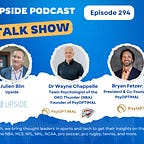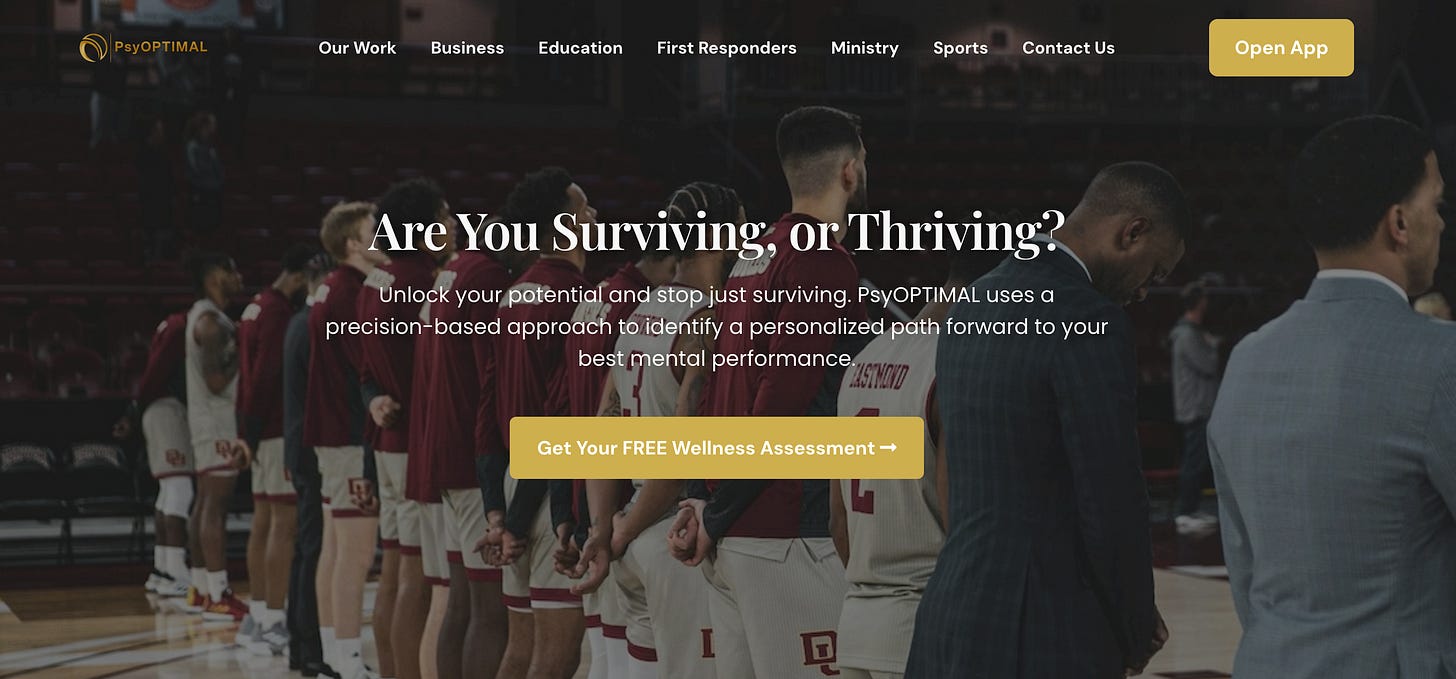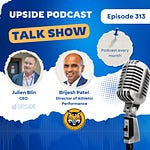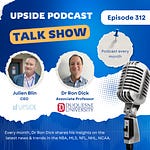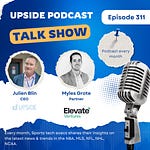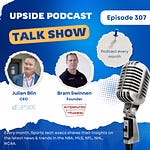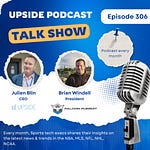Today we have the honor of interviewing Dr Wayne Chappelle, Team Psychologist of the OKC Thunder & Founder of PsyOPTIMAL . He is joined by Bryan Fetzer, President & Co-Founder, PsyOPTIMAL.
Dr. Wayne Chappelle is a performance psychologist whose career spans Olympic sport, U.S. military special operations, and the NBA. Originally trained in clinical psychology, he shifted his focus toward understanding the psychological skills that help individuals perform at the highest level in high-pressure environments. He currently serves as the team psychologist for the Oklahoma City Thunder (NBA) and is the co-founder of PsyOPTIMAL, a performance and wellbeing platform that gives elite teams science-backed insights into mental readiness, resilience, communication, and culture.
Bryan Fetzer is the President and Co-Founder of PsyOPTIMAL and a sports executive with nearly 30 years of experience in collegiate and professional athletics. After more than two decades as a Division I coach, he recognized that while teams talked about the importance of the mental side of performance, they lacked structured tools to develop it. Through PsyOPTIMAL, he now helps organizations use data-driven assessments to improve player development, team cohesion, and leadership across elite sports environments.
You can watch the video interview below by clicking on the Youtube link. You can also listen to the audio interview by clicking on the link at the top of the page:
Where PsyOPTIMAL can plug into your team’s ecosystem:
Player readiness & availability (week-to-week)
Short, secure wellness check-ins give your performance/medical/mental health staff a real-time view of stress, focus, and recovery trends.
Flags show up early (sleep, burnout, confidence, off-field stress), so you can support guys before it becomes a missed game or a bigger issue.
Game-week preparation & “mental game plan”
Map the mental side of the week (install days, travel, short weeks, prime-time games) and give coaches simple “plays” they can run to stabilize the locker room.
Position coaches get a quick snapshot of how their room is doing, so they can adjust meetings, messaging, and leadership moments.
Draft, free agency & player development
Use PsyOPTIMAL as a complement to your scouting and interviews—understanding how players typically handle pressure, adversity, and role changes.
Onboarding rookies and new vets with a baseline profile helps you tailor support and development (who needs structure, who thrives with autonomy, who might need extra touchpoints).
Return-to-play & long-term rehab
Track the mental side of injury: confidence in the body, frustration, isolation, purpose.
Gives your medical, performance, and mental health staff a shared, non-clinical language and data set to support the player all the way back to the field.
Culture, cohesion & leadership
Cohesion metrics by position group and unit help you see where the locker room is tight and where there may be early signs of friction or drift.
Leadership can target specific position rooms with the right conversations, captains, or staff support instead of guessing.
Staff & coach wellbeing
Optional modules for coaches and key staff to monitor their own stress and burnout risk.
Helps protect the people who carry the emotional load for the organization, without adding another platform or heavy lift.
Why teams like it:
Built for elite environments: Originally developed by Dr. Wayne Chappelle for U.S. Special Operations and now used in pro sports settings.
Low lift: 90–120 seconds per check-in; we integrate with your existing staff and processes rather than replacing them.
Privacy-first: Players’ individual data is protected; leadership sees trends and actionable insights, not therapy notes.
You can sign up for a free trial by clicking on the link below:
📝Show Notes: During the interview they discussed how Dr. Wayne Chappelle and Bryan Fetzer came together to build PsyOPTIMAL after recognizing that mental performance was often talked about in elite sports but rarely supported with practical, science-based tools. Chappelle shared how his path through Olympic sport and military special operations shaped his approach to understanding what helps individuals achieve the extraordinary, while Fetzer explained that decades of coaching showed him the need for a measurable, structured system to support the psychological side of performance. This led to the development of a mobile platform that gives athletes and coaches fast, research-driven assessments of wellness, attitude, cohesion, and behavioral factors linked to performance.
During the interview they discussed how teams in the NBA and Division I college sports are using PsyOPTIMAL to improve culture, communication, accountability, and player development by replacing guesswork with clear data. Dr Chappelle described how aggregated insights can reveal problems hidden by short-term success and gave examples of teams like the University of Dayton using the tool to rapidly align new players around shared standards. They also covered new features coming to the platform—including multilingual expansion and new injury psychology assessments—and Dr Chappelle provided insight into the day-to-day work of an NBA psychologist, ranging from observing practice to helping players navigate performance stress and off-court challenges.
You can read the full transcript of the podcast interview with Mark located at the top of this blog post.
Here are the quotes from the interview with Dr Wayne Chappelle and Bryan Fetzer:
✅ 1. Personal Journeys
Dr. Wayne Chappelle
“My original training and background was in clinical psychology, and that was really helping people who were struggling in specific areas of their life learn how to live a normal daily life. And that for me was satisfying, but I really wanted to know how to take an ordinary individual to accomplish the extraordinary. That led to a journey with professional sports athletes, actually starting with Olympic athletes, which then moved into the military special operations environment. I spent 20 years in special operations, which naturally led me to professional elite sports where people have to operate at a very high level in physically demanding, psychologically taxing, and highly precise environments.”
Bryan Fetzer
“I spent 29 years in college and pro sports, 23 of them as a college coach. When I looked back, the mental part of performance was such a cliché for a coach because you would constantly tell a player, ‘It’s mental,’ or ‘You’ve got to do better mentally.’ But we were never really trained on it, and we never really did a whole lot to improve it. You were just trying to figure it out on your own. When Wayne and I connected, and I saw the assessments he had been using in the military and with OKC, it was a no-brainer for me to help build a company that could help coaches and administrators address processes that typically get overlooked.”
✅ 2. Moment that inspired founding PsyOPTIMAL
Bryan Fetzer
“For years coaches like me were saying that performance was mental, but we were never given tools or training on how to improve the mental side of the game. It was all guesswork and personal opinion. So when Wayne brought forward the assessments he had refined over years of military and elite psychological work, it made complete sense to build something that didn’t exist – a system that could actually measure the things we were talking about, instead of leaving coaches to figure it out on their own.”
Dr. Wayne Chappelle
“There are a lot of opinions about what people think they need to work on, but once athletes complete the assessments, they truly know what they need to work on – there’s no second guessing. Someone might say, ‘This is an anxiety issue,’ but based on the results I might say, ‘No, this is actually a confidence issue,’ or, ‘This is an energy issue coming from gaps in rest, recovery, diet, or self-discipline.’ The platform removes guesswork and gives clarity, which is something existing tools simply weren’t doing.”
✅ 3. What makes PsyOPTIMAL different
On accessibility & usability
“The platform is a very user-friendly system where you can take assessments off your cell phone at any point in time, no matter where you are or how much you’re traveling. We didn’t want a model where a psychologist had to administer everything. It needed to be accessible, on-demand, and something athletes could take ownership of. You simply create an account and can begin completing assessments on your own.”
On measuring what others don’t
“One differentiator is our measures. For example, we can assess overall psychological wellness in about 90 seconds – and we can quickly determine whether someone is struggling, surviving, or thriving. In elite sports, you need to be thriving. But beyond personal attitude, confidence, and energy, we also measure the relationship an athlete has with their teammates and coach. Cohesion is absolutely critical, because you can take an average-talent team with high cohesion and over the long term they will always outperform a highly talented but divided team. Most platforms don’t measure whether someone feels valued, trusted, respected, or able to collaborate with others – we do.”
✅ 4. How elite teams are using it and the concrete impact
Bryan Fetzer – giving coaches a real pulse on the team
“Results are given individually and in aggregate. As a coach or administrator, you can see how the whole team dynamic is trending, and that’s incredibly powerful. So many times as a coach you think things are great, but the team could be on the verge of a train wreck and you wouldn’t know it because you’re winning. Winning becomes an easy cop-out: ‘We’re winning, everything’s good.’ But sometimes you’re winning early in the season against weaker teams, or success is masking problems. With aggregate reporting, you can see the true pulse of your team and coach more intentionally.”
Dr. Chappelle – accelerating culture at Dayton
“At the University of Dayton, they had nine new players out of a 15-man roster. Normally you rely on time to establish culture, but they didn’t have that luxury – they needed the team aligned quickly. So we measured emotional resilience, cohesion, trust, compliance, self-discipline, and other cultural drivers at the start of the season. Now players know what they will be held accountable to, what the organization values, and what the expectations are. Instead of taking months to establish culture, the platform compresses that timeline dramatically because everyone is immediately operating from the same understanding.”
On reducing guesswork and aligning departments
“One major outcome is that everyone – coaches, performance staff, psychologists – understands what the actual issue is, and they can work together to solve it. Then after four or five weeks, we can reassess and see whether improvements in psychological factors are lining up with improvements in execution and effort in competition. It gives teams a way to measure whether what they’re doing is actually working.”
✅ 5. New innovations coming to the platform
Bryan Fetzer – multilingual expansion
“One of the biggest additions is adding languages. We have English now, and the next rollout is Spanish, which is incredibly important given basketball, baseball, and soccer globally – especially in the United States. And we will continue adding other languages after that.”
Dr. Chappelle – new assessment for injury recovery psychology
“We’re adding an assessment that looks at an athlete’s perception of injury recovery – their belief in the process, their compliance, and their trust in the medical team. We know that if an elite athlete is out longer than a month, 30–40% typically experience anxiety, depression, or adjustment-related disorders. They may be thinking, ‘Someone else is playing well in my position. Will I ever get back to where I was?’ So being able to assess and support athletes at that stage is crucial.”
✅ 6. Day-to-day of an NBA psychologist & modern league trends
Dr. Chappelle - On what the role actually looks like
“First, it’s really about being available. You want to be on the court at practice, in the strength and conditioning gym, observing day-to-day interactions. From that alone you get a sense of who is doing well and who may be struggling. You might spend an hour with a player working on managing performance anxiety or dialing in pre-game mental routines. You might meet with a physician about an injured player and strategize on how to build trust and lower stress during rehab. Or you might work with a coach who wants to move a player to a different position and needs to understand how that athlete learns and adapts best.”
On showing skeptical players the relevance
“Some athletes may see sports psychology as a sign of weakness, so you must demonstrate relevance. They need to know you’re not just there to treat anxiety or depression. A player might be perfectly healthy and performing well, but can still get better. Or maybe something off the court is distracting them – conflict with parents, a spouse, or suddenly navigating large amounts of money. By helping them in areas beyond the court, they begin to understand that you’re there to help them improve their performance and their lives – and that builds buy-in.”
You may also like:

